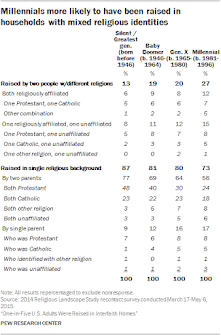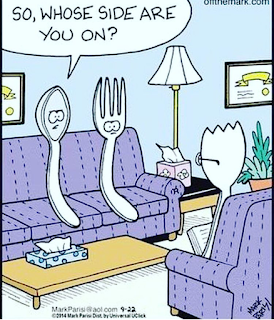I came across a book [in 2009] about a man losing his faith. I flipped it open and
immediately come across this argument (which I've encountered before):
I know so many religious people who don't practice what they preach;
their religions (organized religions, usually) must therefore be
pointless or useless or false.
I wanted to go on record as saying,
I have never understood this argument. It rests on several fallacies, and the fallacies are, well, fallacious:
Fallacy #1: People practice their beliefs.
Got people? The gap between practice and belief is a fundamental truth
of human nature from parents who smoke but tell their kids not to all
the way to environmentalists who inform you about the earth's dwindling
resources with one of their
2 million pamphlets (recycle,
schmycled: it's still paper). These are, perhaps, obvious
hypocrisies. There are still the usual gaps between private and public
acts/beliefs and between private and public faces. Yes, ideally (see 2), people
should be the same everywhere they go though I'm not even sure about
that. I'm politically libertarian and religiously conservative. That is,
I support certain actions politically that I don't practice personally.
However, I don't pretend about it to anyone, so maybe that's the point.
Fallacy #2: People should practice their beliefs, and if they don't, their beliefs are not true or good.
The problem with this argument--which is obviously problematic but lots
of people buy into it--is its corollary: If people do practice their
beliefs, those beliefs
must be true (martyrdom is often seen in this light). Most people will reject the latter
statement as erroneous but accept the prior statement as true.
If I'm right, and people are flawed, then #2 is a non-starter. If I drive over the speed limit, that doesn't mean there
is no speed limit. It could mean that the speed limit is unfairly low. But that is arguably an entirely different matter from whether or not a speed limit exists, which is a separate matter from whether a speed limit is a good idea.
A thing can be true. It can be untrue. How people react to that truth is an independent and personal matter.
Arguably, in the long run, bad beliefs will consistently result in bad outcomes and good beliefs will consistently result in good outcomes ("fruit of the tree") but those experiments rest on people trying out the beliefs in the first place.
Fallacy #3: People should practice their beliefs, but if they only
practice part of them, that's as good as them not practicing any of
them.
This argument isn't too different from that bumper sticker I hate:
"No one is free if others are oppressed." And it is so fundamentally
inaccurate (and nihilistic), it's hard to know how reasonable/perceptive people can
believe it. A man may be nice to his wife and kids but not so nice to
his neighbors. It doesn't follow that his inability to be nice to
everyone means that he is an entire failure at his religion (though it does depend on the religion) or that he should stop being nice to everyone entirely.
 Of course, he probably should be nice to his neighbors. But it isn't an either/or proposition. Flaws do not indicate complete failure. I
suppose there is a point where the equation tips, and the flaws
outweigh the average person's ability to be perceived as good and kind.
But from my perspective, that equation had better be pretty generous. I
think many an academic argument has failed to understand an event or
individual because the equation was not generous enough. I'm reading The Magician's Book
by Laura Miller right now in which Miller attempts to balance what
she perceives as C.S. Lewis's flaws with his talents in order to reach a
balanced appreciation of books (the Narnia Chronicles) she loved as a
child. I don't completely agree with her analysis or her arguments (or
even her form of criticism since I put more weight on performance than I
do on reading-between-the-lines), but I can read her book because of
her generous perspective.
Of course, he probably should be nice to his neighbors. But it isn't an either/or proposition. Flaws do not indicate complete failure. I
suppose there is a point where the equation tips, and the flaws
outweigh the average person's ability to be perceived as good and kind.
But from my perspective, that equation had better be pretty generous. I
think many an academic argument has failed to understand an event or
individual because the equation was not generous enough. I'm reading The Magician's Book
by Laura Miller right now in which Miller attempts to balance what
she perceives as C.S. Lewis's flaws with his talents in order to reach a
balanced appreciation of books (the Narnia Chronicles) she loved as a
child. I don't completely agree with her analysis or her arguments (or
even her form of criticism since I put more weight on performance than I
do on reading-between-the-lines), but I can read her book because of
her generous perspective.
Deciding that someone's failure to live up to an ideal is the sum total
of someone's personality is not an accurate, or charitable,
assessment.
 |
All groups are strange.
|
Fallacy #4: All groups are nasty to outsiders, thus all groups are bad;
if someone is dissatisfied with a group (i.e. organized religion), it
must mean that group has treated that person badly and behaved
intolerantly (no other reason).
The truth is, the first part of the above statement appears to be part of the human condition: groups are nasty to outsiders.
Back when I lived in Washington State, I listen to a lot of talk radio.
One day, I was listening to a discussion of "whether gays can be
Republican." I don't really understand these types of arguments. I
figure people can do whatever they want. But the guest speaker, a gay
writer about economics, was talking, and I
started listening, and okay, I'll admit, economics mostly bore me but he had a fantastic voice: Bing
Crosby meets James Earl Jones. Golden honey.
So he got done talking, and people started calling in, and a lot of the
callers said things like, "Hi, I'm a fundamentalist conservative, and I
think what you have to say is great!"
Any guesses on the angriest callers? Yep, those who thought the man had
"betrayed" the Democratic Party by being a fiscal conservative.
I think my disillusionment about so-called liberal/left "tolerance"
started about then. Actually, I was never really "disillusioned" because
I've never really believed liberals were automatically more tolerant
than anyone else, but my belief that similar types of human reactions
can be found within any group received serious support on that day.
Unfortunately that reaction--"Traitor!"--isn't atypical. Humans are social animals
and tend to act accordingly. We shouldn't (says the libertarian in me),
but we do.
What bothers me about the claim, "All groups are nasty to outsiders,
thus all groups are bad, so all dissatisfaction by the
individual must be due to the group" is how seldom that claim allows for
nuance and complication: that is, a group behaves a certain way, and
everyone assumes that the group is behaving according to the cliché
without examining the underlying, individual causes or variations.
Example #1: Burning witches is nasty; however, the cliché is that
sweet, angelic, herb-planting midwives were scampering about their
beautiful gardens worshiping earth-goddesses when the mean patriarchy
(organized group) came along and burned them. For no reason at all!
Writers, such as Diane Purkiss, have pointed out that the witches
weren't always angelic or midwives. In fact, often midwives testified
against witches. Writers, such as Dan
Burton and David Grandy, have pointed out that most witch accusations
were made in small communities with long-standing grudges (not
exactly systematic) and that in the few cases where accusations were
systematic, men and boys were often executed as well.
The cliché tells a generalized truth: generally, women were accused and
executed more than men, and generally, they tended to be marginalized
members of their communities. Plus burning witches isn't nice. But it
misses all the real-life realities: all the interesting stuff about
actual trials and cases and individuals.
Example #2: When I first moved to Maine, I worked as a secretary in a
law school. It was one of the most ideologically diverse places I've
ever worked. We were all white but religiously and politically speaking,
we had a representative for just about every position: mainstream,
fundamentalist, atheist, agnostic, Democratic, liberal, Republican,
conservative, Marxist . . .
Everyone got along okay, but ideologically-speaking, I was just about
the only person there who didn't think someone was out to get me: big
business, liberals, crazy religious people, diehard right-wingers, etc.
etc. etc.
I figured they couldn't all be right--at least, not all right in the
same place at the same time: Southern Maine wasn't going to become, in
the next ten years, a left-leaning, fascist nightmare filled with
godless, God-fearing fundamentalist Donald Trumps. I mean, sure, Maine
taxes people too much, but I'm not sure one could blame that on left-leaning-fascist-godless-God-fearing-fundamentalist-Donald-Trumps.
One could try, I suppose. But it would be kind of hard. I don't
think even I could do it, and I believe that people are complicated and
don't come all-of-a-piece.
This is the problem with saying (to condense the fallacy), "Oh, the
group is to blame; the group is making me unhappy." It could be true.
The people where I worked believed it was true, but that didn't automatically make it true or even probable. In fact, they'd each created an image of an anti-group and then become frightened by the image. (Who are all these conspiring people? Where are they?) I was more impressed by the fact that everyone got along okay, no matter how paranoid.
In other words, groups can behave badly, but they also usually behave
complexly, so blaming the group (rather than the individual) may be
correct, but it also may not, especially since the group--or the image
of the group--may not even exist. In any case, "the group as bad guy" is
not a given.
The above is an Easter message because--unlike some of the early 1800s religious messages
I've been researching lately--this message asserts that perfection is not a requirement for God's grace. We needn't be ashamed of our imperfect natures or try to force that shame on others through illogical arguments.
The exact nature of the relationship between grace and energy or desire or improvement is a difficult one--and not one I will attempt to solve here. Suffice to say:
It is a possible one.















































